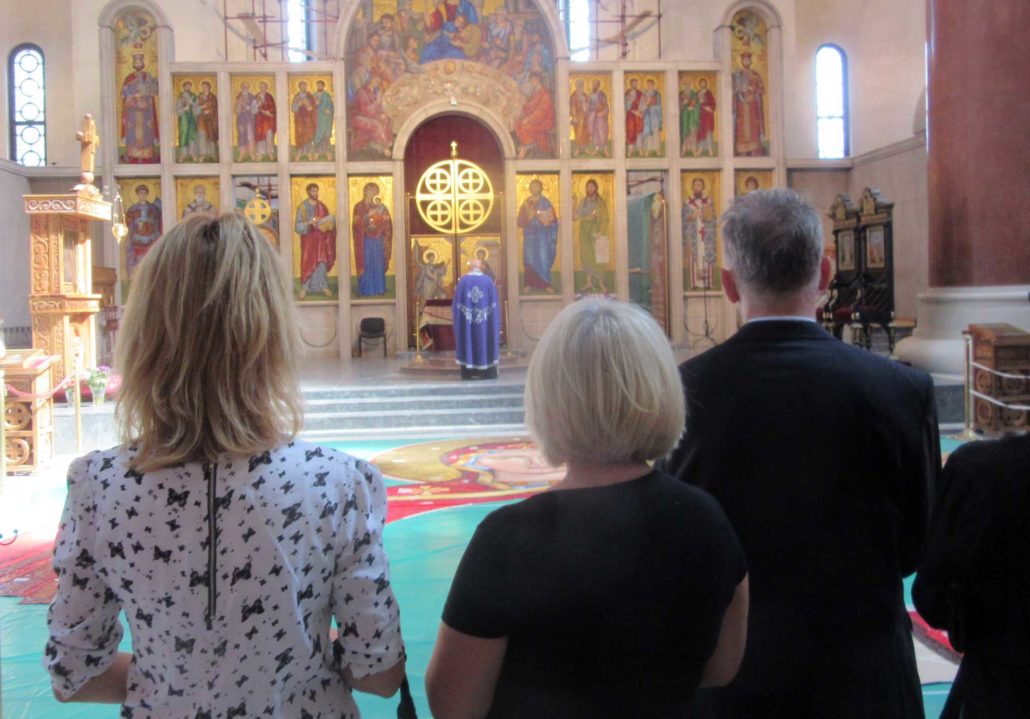
BELGRADE – A tribute for 88 victims was paid Friday at the St Mark Church in Belgrade in memory of the Serbs brutally killed by the Croatian troops during Operation Medak Pocket in the south-central Lika region of Croatia on September 9, 1993.
Participants of the commemoration said that the crime went unpunished and that the executioners later received recognition from the Croatian society.
Dragan Pjevac, head of the Coordination of Serbian Associations of Missing Persons’ Families from the Former Yugoslavia, told Srna that Davor Domazet Loso, the prime suspect in the brutal murder of the people of Divoselo, Pocitelj and Citluk, was recently appointed advisor to Croatian President Kolinda Grabar Kitarovic, the first accused Rahim Ademi was acquitted, while the second accused Mirko Norac was sentenced to six years in jail for “failure to act”.
“My mother Boja was killed in Pocitelj a few kilometres away from home. She was found by my brother Nikola 18 days later, her head smashed and three fingers cut off. A year ago, the victims’ families lodged a 16-page criminal report against Domazet detailing the arguments and facts corroborating his responsibility for those crimes, but we haven’t received any reply yet,” Pjevac said.
Under such circumstances and in an environment where more than 50 percent of young Croats believe that the Ustasha were more positive than the partisans, he doubts that the responsible will be prosecuted and the search for the missing from the Medak Pocket and all other execution sites finished.
“We are still searching for 14 bodies and it is up to us the families and the Serbian society as a whole to fight for our victims, both from WWII and the 1990s war, with the truth as a weapon. The victims need peace and respect, not politics,” said Pjevac.
Professor Mile Rajcevic, who fled Divoselo, said that in his village 30 residents were killed and everything else wiped out in September 1993, which made Operation Medak Pocket an act of genocide.
During the crimes, the Lika villages where the pogrom occurred were under UNPROFOR’s protection for 18 months and the UN organisation “failed to protect the Serb civilians,” said Rajcevic.
“The people who got there after the slaughter saw some disturbing scenes. Like those left by the Spanish Inquisition and even worse, because no one was spared. Everyone was killed,” said Rajcevic.
His home village is totally desolate now – no inhabitants, just the charred remnants and graves indicating that people used to live there.
Operation Medak Pocket, also known as the Bloody September in Lika, was the Croatia’s third attack on the troops of the Republic of Serbian Krajina /RSK/ since the RSK territory was placed under the UNPROFOR protection.
The attack began on September 9, 1993 when the Croatian troops raided the Serbian villages of Divoselo, Citluk and Pocitelj, murdering 88 Serbs, including 36 civilians.
Seventeen were women, 26 were over 60 years of age, while 14 are still listed missing.
UNPROFOR Commander Jean Cot, who visited the site immediately after the atrocity, wrote this in a report: “I haven’t found any sign of life; no people, no animals. In several villages we passed through today the destruction is total, systematic and intentional.”
